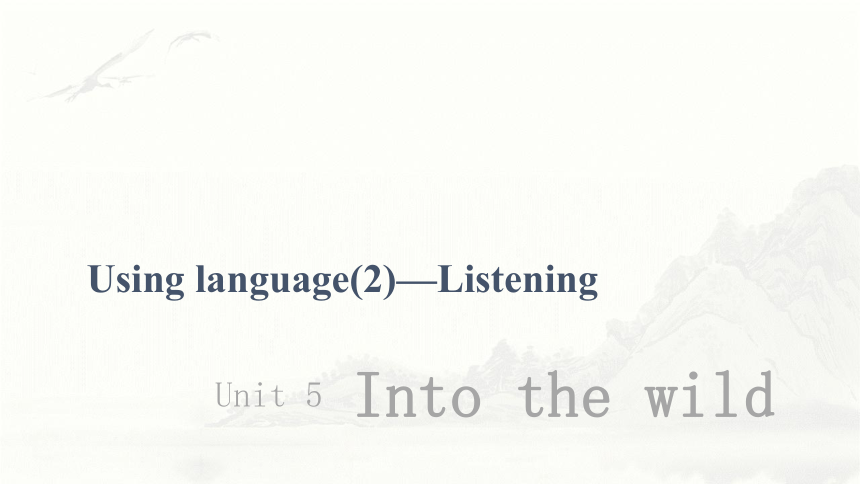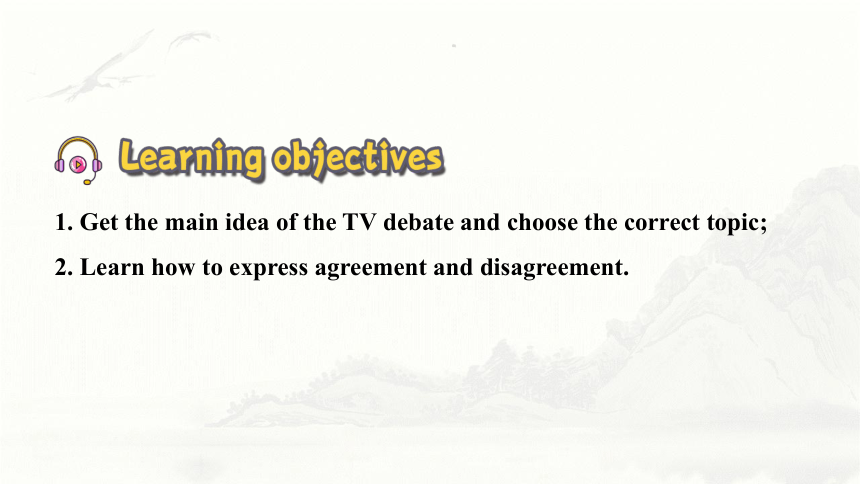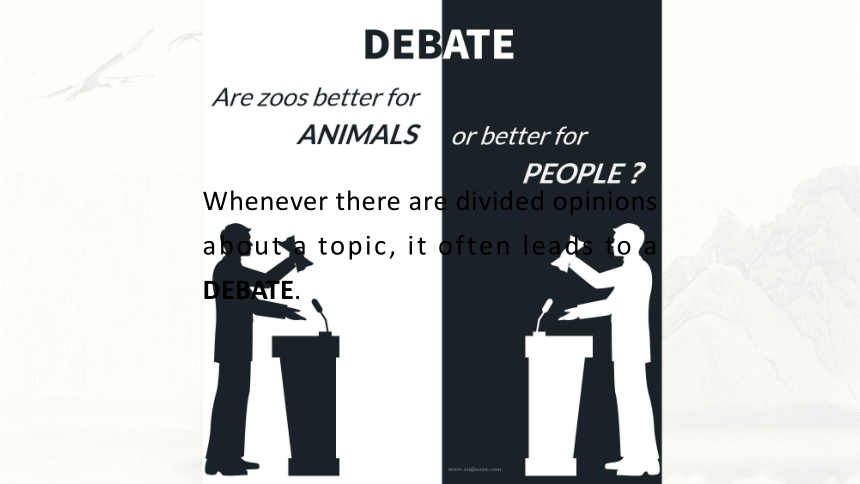外研版(2019)必修 第一册Unit 5 Into the wild Listening课件 (共16张PPT,内镶嵌音频)
文档属性
| 名称 | 外研版(2019)必修 第一册Unit 5 Into the wild Listening课件 (共16张PPT,内镶嵌音频) |  | |
| 格式 | pptx | ||
| 文件大小 | 19.4MB | ||
| 资源类型 | 教案 | ||
| 版本资源 | 外研版(2019) | ||
| 科目 | 英语 | ||
| 更新时间 | 2023-10-09 21:31:31 | ||
图片预览







文档简介
(共16张PPT)
Using language(2)—Listening
Into the wild
Unit 5
1. Get the main idea of the TV debate and choose the correct topic;
2. Learn how to express agreement and disagreement.
Did you know
Dogs were first domesticated over 14,000 years ago. Sheep, cows and pigs have been kept at home as sources of food for around 7,000 years.
The oldest zoo in the world is in Vienna, opened in 1752. The oldest zoo in China is Beijing Zoo, which was founded in 1906.
Pre-listening
The oldest zoo in the world is in Vienna.
Beijing zoo is the oldest zoo in China, which was founded in 1906.
Have you ever visited a zoo
What’s your feeling when you see the animals there
Whenever there are divided opinions about a topic, it often leads to a DEBATE.
Listening Tips
In a debate, first listen out for the main topic. The main topic is usually a statement or a question at the very start of the debate.
Listen to the TV debate and choose the correct topic.
1 Can zoo animals survive in the wild
2 Can zoos offer animals their natural environment
3 Should we keep wild animals in zoos
4 Should we educate people more about animals
√
While-listening
Zoos animals can ________________________ and be unable to live on their own when return to the wild.
Zoos cannot offer animals an environment that’s __________ their natural one.
Zoos _______________ people than for animals.
Zoos can help protect animals ___________________.
Zoos are a good way to _________________________.
Zoos allow us to see and learn about animals in places similar to their_________________.
Listen again and complete the mind map.
in danger of dying out
educate people about animals
natural environments
depend too much on humans
as good as
do more good for
Listen again and find out how the speakers express agreement and disagreement.
Disagree:
1.______________________ that these programmes are always successful.
2. ___________________ there are successful ones.
3. I’m sorry, but ________________.
Agree:
1.________________ people should learn as much as possible about animals.
2. Exactly!
I am afraid I don’t agree
But you must admit
that’s just not true
I totally agree that
Summary about debate
For
supporting ideas…
Against
supporting ideas…
Listen again and focus on how the speakers express
agreement and disagreement.
DJ: Joining us today we have zookeeper Max Wilson, and Amy Lee from the organisation Keep Wild Animals Wild. They are here to discuss whether we should keep wild animals in zoos. Max, let’s start with you.
Max: As a zookeeper, I’ve seen how zoos help protect animals in danger of dying out. For example, my zoo is well-known for its programme to save tigers.
Amy: I am afraid I don’t agree that these programmes are always successful. We’ve seen a lot of examples where the animals start to depend too much on humans, and are unable to live on their own when returned to the wild. We’ve seen a lot of examples that have failed.
Max: But you must admit there are successful ones. And zoos are also a good way to educate people about animals. That’s killing two birds with one stone.
Amy: Oh, I totally agree that people should learn as much as possible about animals because we share the planet with them.
Max: Exactly. Zoos allow us to observe animals in places that are similar to their natural environments.
Amy: I am sorry, but that’s just not true. No zoo can offer its animals an environment that’s as good as their natural one. Elephants, for example, need a huge amount of space to live happily. On the whole, I think zoos do more good for people than for animals.
DJ: Well, I think we all agree that we should do our best to help protect animals and teach people more about them. Let’s continue this discussion after a short break.
Student A: agree
You are in favor of keeping animals as pets. You have the following arguments:
1. Keeping pets develops a kind and caring attitude towards animals.
2. Keeping pets is good for people’s physical and mental health.
3. Keeping pets helps people know more about animals.
Student B: disagree
You are against keeping animals as pets. You have the following arguments:
1. Caring for other people is more important than caring for animals.
2. It is bad for animals’s physical and mental health to be kept as pets.
3. Animals kept at home can cause trouble for neighbours.
Work in pairs.
Topic: whether we should keep animals as pets.
Post-Listening
Show Time!
Using language(2)—Listening
Into the wild
Unit 5
1. Get the main idea of the TV debate and choose the correct topic;
2. Learn how to express agreement and disagreement.
Did you know
Dogs were first domesticated over 14,000 years ago. Sheep, cows and pigs have been kept at home as sources of food for around 7,000 years.
The oldest zoo in the world is in Vienna, opened in 1752. The oldest zoo in China is Beijing Zoo, which was founded in 1906.
Pre-listening
The oldest zoo in the world is in Vienna.
Beijing zoo is the oldest zoo in China, which was founded in 1906.
Have you ever visited a zoo
What’s your feeling when you see the animals there
Whenever there are divided opinions about a topic, it often leads to a DEBATE.
Listening Tips
In a debate, first listen out for the main topic. The main topic is usually a statement or a question at the very start of the debate.
Listen to the TV debate and choose the correct topic.
1 Can zoo animals survive in the wild
2 Can zoos offer animals their natural environment
3 Should we keep wild animals in zoos
4 Should we educate people more about animals
√
While-listening
Zoos animals can ________________________ and be unable to live on their own when return to the wild.
Zoos cannot offer animals an environment that’s __________ their natural one.
Zoos _______________ people than for animals.
Zoos can help protect animals ___________________.
Zoos are a good way to _________________________.
Zoos allow us to see and learn about animals in places similar to their_________________.
Listen again and complete the mind map.
in danger of dying out
educate people about animals
natural environments
depend too much on humans
as good as
do more good for
Listen again and find out how the speakers express agreement and disagreement.
Disagree:
1.______________________ that these programmes are always successful.
2. ___________________ there are successful ones.
3. I’m sorry, but ________________.
Agree:
1.________________ people should learn as much as possible about animals.
2. Exactly!
I am afraid I don’t agree
But you must admit
that’s just not true
I totally agree that
Summary about debate
For
supporting ideas…
Against
supporting ideas…
Listen again and focus on how the speakers express
agreement and disagreement.
DJ: Joining us today we have zookeeper Max Wilson, and Amy Lee from the organisation Keep Wild Animals Wild. They are here to discuss whether we should keep wild animals in zoos. Max, let’s start with you.
Max: As a zookeeper, I’ve seen how zoos help protect animals in danger of dying out. For example, my zoo is well-known for its programme to save tigers.
Amy: I am afraid I don’t agree that these programmes are always successful. We’ve seen a lot of examples where the animals start to depend too much on humans, and are unable to live on their own when returned to the wild. We’ve seen a lot of examples that have failed.
Max: But you must admit there are successful ones. And zoos are also a good way to educate people about animals. That’s killing two birds with one stone.
Amy: Oh, I totally agree that people should learn as much as possible about animals because we share the planet with them.
Max: Exactly. Zoos allow us to observe animals in places that are similar to their natural environments.
Amy: I am sorry, but that’s just not true. No zoo can offer its animals an environment that’s as good as their natural one. Elephants, for example, need a huge amount of space to live happily. On the whole, I think zoos do more good for people than for animals.
DJ: Well, I think we all agree that we should do our best to help protect animals and teach people more about them. Let’s continue this discussion after a short break.
Student A: agree
You are in favor of keeping animals as pets. You have the following arguments:
1. Keeping pets develops a kind and caring attitude towards animals.
2. Keeping pets is good for people’s physical and mental health.
3. Keeping pets helps people know more about animals.
Student B: disagree
You are against keeping animals as pets. You have the following arguments:
1. Caring for other people is more important than caring for animals.
2. It is bad for animals’s physical and mental health to be kept as pets.
3. Animals kept at home can cause trouble for neighbours.
Work in pairs.
Topic: whether we should keep animals as pets.
Post-Listening
Show Time!
